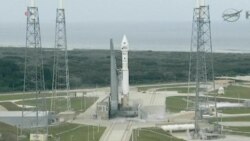The U.S. space agency has launched a new exploratory mission to Mars, hoping to learn more about the Red Planet's mysterious atmosphere and climate.
The National Aeronatics and Space Administration (NASA) sent its Maven spacecraft skyward Monday aboard an unmanned Atlas V missile. It was launched from the government's Cape Canaveral facility in Florida along the southeastern U.S. shoreline.
If all goes well, Maven, carrying eight science instruments, will reach Mars in 10 months (next September), and then settle into an orbit around the planet.
NASA has already attempted 20 missions to Mars, with 14 of them successful. In the new mission, NASA's lead Mars scientist, Michael Meyer, says experts are hoping to answer what happened to Mars' atmosphere, maybe billions of years ago, that transformed it from being warm and wet to the cold and dry planet it is today.
"The environment at one point in time on Mars was able to support microbial life. But you look at Mars today, it's cold, it's dry, and we want to know what happened," he said.
NASA said Maven is the first spacecraft designed to explore the upper Martian atmosphere. The space agency previously has sent a series of rovers to explore the surface of Mars, including its latest, Curiosity, which arrived last year.
India launched a deep space orbiter earlier this month designed to look for traces of methane on Mars, which could prove the existence of some form of ancient life form on the planet. It could arrive two days later than the U.S. satellite.
The Maven mission is costing $671 million. The satellite name is an acronym, standing for Mars Atmosphere and Volatile EvolutioN.
The National Aeronatics and Space Administration (NASA) sent its Maven spacecraft skyward Monday aboard an unmanned Atlas V missile. It was launched from the government's Cape Canaveral facility in Florida along the southeastern U.S. shoreline.
If all goes well, Maven, carrying eight science instruments, will reach Mars in 10 months (next September), and then settle into an orbit around the planet.
NASA has already attempted 20 missions to Mars, with 14 of them successful. In the new mission, NASA's lead Mars scientist, Michael Meyer, says experts are hoping to answer what happened to Mars' atmosphere, maybe billions of years ago, that transformed it from being warm and wet to the cold and dry planet it is today.
"The environment at one point in time on Mars was able to support microbial life. But you look at Mars today, it's cold, it's dry, and we want to know what happened," he said.
NASA said Maven is the first spacecraft designed to explore the upper Martian atmosphere. The space agency previously has sent a series of rovers to explore the surface of Mars, including its latest, Curiosity, which arrived last year.
India launched a deep space orbiter earlier this month designed to look for traces of methane on Mars, which could prove the existence of some form of ancient life form on the planet. It could arrive two days later than the U.S. satellite.
The Maven mission is costing $671 million. The satellite name is an acronym, standing for Mars Atmosphere and Volatile EvolutioN.






